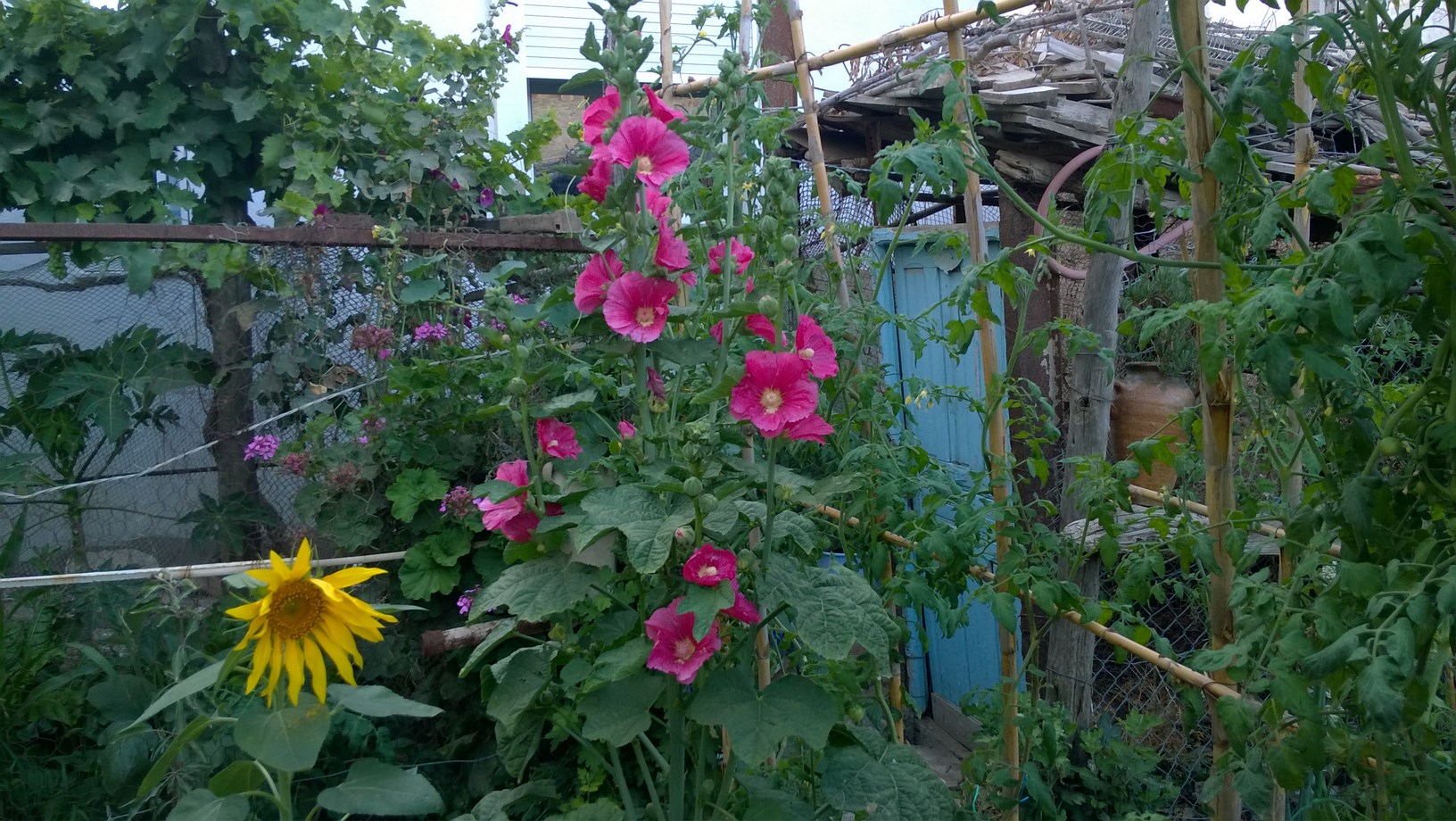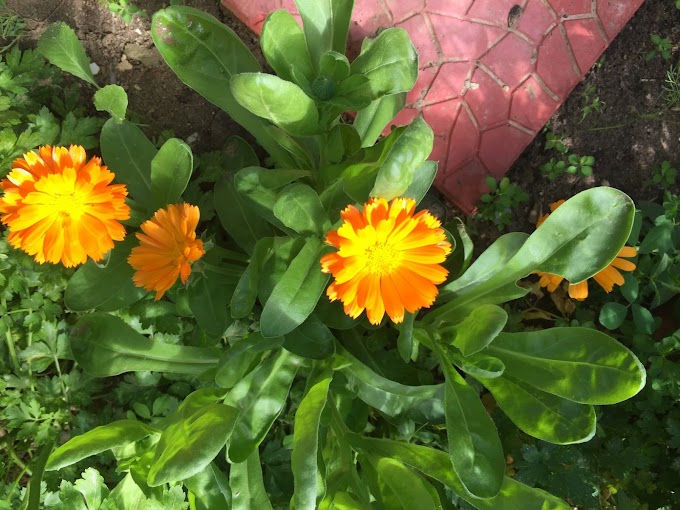This is true whether you have a big garden or a small backyard . There would always be something interesting to put into action, no matter how much space you have. You only need a bit of creativity, and even if you live in an apartment or only have a small patch , gardening will make your home so much better.
Sitting in your backyard, sipping in your tea would never be the same with an amazing garden.
The best way to learn is to get dirty!
- Decide whether you are going to build raised beds, plant directly in the ground, or possibly use containers. Get an idea. Is this going to be a vegetable garden? A herb garden? A flower garden? If you choose to grow flowers, do you want annuals, which you must replant each year, but which give color most of the summer? Or do you prefer perennials, which have a shorter bloom time but come back year after year?
- Almost all vegetables and most flowers need about six hours of full sun each day. Spend a day in your chosen spot and watch how the sun moves across the space. It might receive more sun than you think. But don't despair if your lot is largely sunless, many plants tolerate shade. If you plant fruit trees next to a raised bed, they may eventually shade out the beds. Decide where you’d like to dig the beds.
- Chop up and remove all grass and weeds.
- Loosen the soil, turning it and pulling out rocks and sticks. Plants’ roots penetrate soft soil easily, so you need nice loamy soil.
- Your soil's texture and drainage determine the kinds of plants you can grow most successfully and influence how you care for your plants.
- The best way to determine the texture of your soil is to check how fast water drains through it!
- Dig a hole 1 foot deep by 1 foot wide.
- Fill the hole with water and record how long it takes for the water to completely drain.
- The ideal time is between 10 and 30 minutes. If it drains in less than 10 minutes, the soil is drought-prone and most suitable for plants that need dry or well-drained soil. If it takes 3 to 4 hours, your soil is poorly drained, due either to a large percentage of clay or an impermeable layer of minerals below the surface that blocks water movement.
- Organic amendments have the added capability of providing additional organic matter and nutrients.
- Add organic material, such as compost, well rotted manure, or shredded leaves to sandy soil to improve its ability to hold water and to clay soil to help it drain more quickly. To learn more about your soil, have a soil test.
- Once you test your soil, determine what will grow, and create a schedule.
- If your flowering plants all bloom in July and then die off, have some evergreen plants to keep the area looking lush. If your tomato plants take months to get big, plant smaller vegetables nearby that can make quick use of the space!
- Choose plants adapted to your climate, your soil, and the amount of sunlight in your garden.
- Don't over water especially at first, be sure not to over water your seeds and starts. Over watered soil can cause seeds to migrate and then pop up where you didn't want them. Over watered pots can cause root rot which will kill your plant. Try to keep the soil evenly moist but not soggy. Water slowly and deeply, so the water soaks in instead of running off into the street. To minimize evaporation, water in the early morning. After that, how often you need to water depends on your soil, how humid your climate is, and how often it rains.
- Start small with just a few different types of plants in a raised bed.
- Your garden is on its way. Keep watering when needed.
Feeding your Soil
Flowers and many vegetables benefit from monthly fertilizing. Fertilizers add nutrients including the two most crucial for a garden: nitrogen, which promotes leaf growth, and phosphorous, which helps with root health. But remember that organic fertilizers is the best.
Different fertilizers are recommended for different purpose in the garden.
One for roses, one for containers and one for vegetables. Each has a different formula of chemicals. If you by a bag of lawn fertilizer, you will see 3 numbers on the packaging , if it is a spring fertilizer for example, the numbers are 20:10:10, and letters N,P,K.
In this case there is :
10 % PHOSPHORUS {P}
10 % POTASSIUM {K}
Nitogen is vital for plant growth ,it is a crucial part of the green
pigment chlorophyll that gathers light energy. It is very important in spring and summer when the grass is growing most vigorously and need nitrogen. But never apply more than the recommended rate. Lot of Nitrogen can lead to excessively lush growth. An autumn lawn fertilizer will have 3:10:10 N,P,K because grass needs far less nitrogen during the winter.
Phosphorus plays a vital part i seed germination and the development of the root system.
Potassium is important for the well being of plants ,it gives plants a
toughness that helps them to survive extreme conditions of cold and dry. Both phosphorus and potassium get locked in the ground, but nitrogen is quickly leached through the soil by rain
The oldest of all fertilizers and still is the best is "Manure". In addition to its nitrogen and other food content, it is high in humus and contains bacteria which improve the soil. Chicken manure for vegetable garden fertilizing will produce excellent soil for your vegetables to grow in.
Watch: how to add chicken manure to the garden soil video
Chicken manure contains plenty of calcium and has an alkaline ph 6.5 to 8. Despite the release of nitrogen containing ammonium which by itself acidifies soil, chicken manure may actually raise your soil ph, and ammonium tends to stick to clay soils. So with this organic matter you have a superb soil conditioner capable of opening up clay soils. Chicken manure is the best of organic fertilizers that you could apply to get good results from demanding crops, fruit bushes and trees, and lawns. You need to provide your plants with a nutrient rich environment in order to grow and make great produce, supplement your garden soil with the best organic compost you can afford. Organic fertilizers are ideal options for gardeners who want to get the most out of their crops without using chemicals that can seep into their food, water and the local environment.
Mulches are an important part of the recycling of energy and nutrients within the garden. With every leaf burnt and every bag of weeds carted to the tip there is a subtraction from the organic content of the garden .It is important to remove leaves from the lawn, otherwise the grass will be killed through lack of light, and their removal will discourage worm activity. They are ideally collected with a rotary lawn mower, which will not only shred them but also mix them up with grass cutting to help in their decomposition. Shredding any vegetation hastens the process of composting by rupturing cells and exposing a greater surface area of plant material to the microbes that do the breaking down. An example of well managed heap, it will become so hot,in fact, that you won't be able to put your hand into it. It is this heat that kills weed seeds in the compost heap ,which is an important function .
To think that all the heat energy is generated by the activity of microscopic organisms makes the process all the more astonishing. Grass cuttings, are an ideal ingredient for the compost heap. They provide moisture and an abundance of nitrogen. Microbes need nitrogen to generate their protein. Heaped on their own, grass cutting heat up, then sink down into a smelly and slimy mess. This is because as they settle all the air is squashed out of the heap so that only anaerobic bacteria{those that need no oxygen}can function, it is these bacteria that provide the smell. What is needed in the heap to prevent the smell and slime are air and carbon. The carbon is used by bacteria with the nitrogen to synthesize protein, and the air will provide oxygen for the odourless aerobic bacteria. The easiest way to provide both air and carbon is to combine the grass with straw in an approximately equal mix.
Straw is mostly carbon but apart from supplying this element it fluffs up the mix and its natural hollow structure allows air into the heap. Regular turning is recommended to maintain a well aerated heap, but if there is sufficient straw in the mix and it is well tossed to start with, it will break down quite rapidly without further mixing. Although wood shavings will provide the necessary carbon, they are not as efficient as straw at keeping the heap open and aerated, so it will require more turning. Leaves are also a source of carbon, if nothing else is available. If you are shredding herbaceous stems and woody twinges, it is useful to throw fresh grass cutting through the shredder as you go to get nitrogen into what is an overly woody, carbon rich heap. The smaller the pieces of woody material you shred, the greater access for bacteria, and the more nitrogen made available through green soft vegetation, the quicker is the breakdown. Tree and shrub leaves contain much more woody fibre than fleshy herbaceous leaves, such as grass, and take longer to break down . However because they decompose more slowly, they offer a good source of long term organic matter, with helps to retain moisture in the soil.

Enjoy an active healthy life, while reaping the benefits of your own-grown flowers, fruit and vegetables !
There’s absolutely nothing like eating fresh and organic vegetables, especially if you grow them yourself.
Whether you are trying to grow vegetables, flowers and aromatic herbs the soil health is important. You must have healthy soil for the plants to grow in. To achieve this goal, you must build the Perfect garden Soil!
Follow these steps, and you’ll have a healthy and beautiful organic garden that provides you with an abundance of fruits and vegetables for years to come!
Love your garden, grow organic food, and enjoy your healthy life!
Affiliate Disclosure!
This website is a participant in the Amazon Services LLC Associates Program, an affiliate advertising program designed to provide a means for sites to earn advertising fees by advertising and linking to Amazon. Some of the links to products on this site are affiliate links. These are products that I've used or recommend based from homesteading experience. I do make a small commission (at no extra cost to you) from these sales. (alert-warning)


















I have simple organic gardening tips for beginners as well as experienced gardeners, which can help people making their organic garden dreams!
ReplyDelete